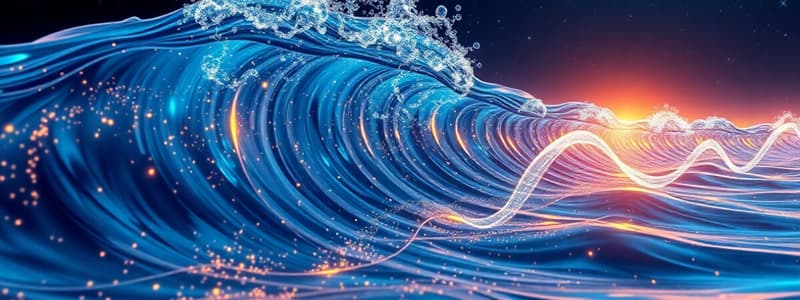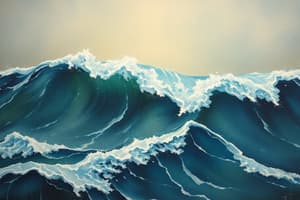Podcast
Questions and Answers
Which characteristic best describes a transverse wave?
Which characteristic best describes a transverse wave?
- It is a type of wave with no significant amplitude.
- The oscillation of the medium is perpendicular to the direction of wave propagation. (correct)
- The wave does not require a medium to travel.
- The oscillation of the medium is parallel to the direction of wave propagation.
The frequency of a wave is measured in centimeters.
The frequency of a wave is measured in centimeters.
False (B)
What is the formula for calculating the velocity of a wave?
What is the formula for calculating the velocity of a wave?
v = λ × f
A wave with a greater amplitude carries more _____ than a wave with a smaller amplitude.
A wave with a greater amplitude carries more _____ than a wave with a smaller amplitude.
Match the wave properties with their definitions:
Match the wave properties with their definitions:
Flashcards
Transverse Wave
Transverse Wave
A type of wave where the medium's oscillations are perpendicular to the wave's direction of motion. Think of a rope tied to a post; you wiggle the rope up and down, causing a wave to move across the rope, but the rope itself only moves up and down.
Longitudinal Wave
Longitudinal Wave
A type of wave where the medium's oscillations are parallel to the wave's direction of motion. Think of a spring that you compress and release; the compression and expansion move along the spring in the same direction as the disturbance.
Wavelength (λ)
Wavelength (λ)
The distance between two consecutive peaks or troughs of a wave. It's the length of a complete wave cycle.
Frequency (f)
Frequency (f)
Signup and view all the flashcards
Velocity (v)
Velocity (v)
Signup and view all the flashcards
Study Notes
Wave Properties
- Waves are disturbances that transfer energy from one place to another
- Waves can be transverse or longitudinal
- Transverse waves vibrate perpendicular to the direction of wave travel
- Longitudinal waves vibrate parallel to the direction of wave travel
- Amplitude: The maximum displacement of a particle from its undisturbed position. Higher amplitude corresponds to louder sound or brighter light.
- Wavelength: The distance between two consecutive corresponding points on a wave (e.g., crest to crest or trough to trough).
- Frequency: The number of waves that pass a given point in a given time. Measured in Hertz (Hz).
- Velocity: The speed at which the wave travels. Calculated by multiplying wavelength by frequency (v = λf)
Wave Energy and Amplitude
- Wave energy is related to amplitude
- Higher amplitude means higher energy
- Higher frequency means higher energy
- Loudness is associated with high amplitude and high energy
- Quietness is associated with low amplitude and low energy
Studying That Suits You
Use AI to generate personalized quizzes and flashcards to suit your learning preferences.




